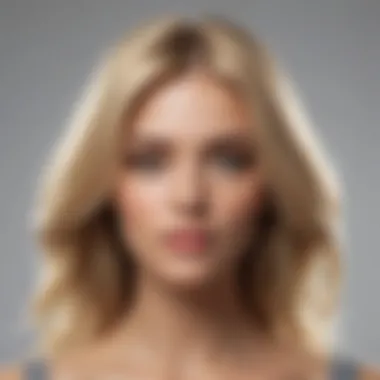Unlocking the Beauty of Transformation: The 'What Would I Look Like as a Blonde' App


News Updates
Diving into the realm of digital transformations, let's explore the 'What Would I Look Like as a Blonde' app. This innovative creation allows users to visualize themselves with a new hair color, sparking curiosity and fascination. The app's cutting-edge technology blends virtual reality with hairstyling expertise to deliver realistic and personalized makeovers. By delving into the mechanics behind such applications, we unravel not just the digital façade but also the psychological implications of altering one's appearance through technology.
Trending Topics
As we navigate the digital landscape, trends in beauty and tech converge with the rise of apps like 'What Would I Look Like as a Blonde.' This fusion of aesthetics and innovation mirrors society's evolving approach to self-expression. The app's popularity sheds light on the intersection of virtual and physical identities, inviting discussions on beauty standards, self-perception, and personal reinvention in the digital age. Analyzing the social media buzz surrounding such tools provides insights into how technology shapes modern aesthetics and influences individual confidence and decision-making.
Synthesizing the information presented, our exploration of the 'What Would I Look Like as a Blonde' app delves beyond superficial transformations, unraveling the intricate web of technology, psychology, and societal trends that underpin virtual makeovers. By peeling back the layers of digital enhancements, we gain a nuanced understanding of the impact these tools have on self-image, identity, and the evolving landscape of beauty in the digital era.
Introduction
In the world of digital transformation, the 'What Would I Look Like as a Blonde' app stands out as a fascinating piece of technology that delves into the realm of virtual makeovers. This article explores the profound impact of visualizing oneself with blonde hair through the lens of this innovative app. By dissecting the features, functionality, popularity, user base, ethical considerations, rise of virtual makeover apps, psychological insights, and societal implications, we aim to provide a comprehensive guide to understanding the allure and consequences of such technological advancements.
Overview of the 'What Would Look Like as a Blonde' App
Features and Functionality
Unveiling the core of the 'What Would I Look Like as a Blonde' app, its features transcend mere superficial alterations. From hair color adjustments to style transformations, the app offers a versatile palette for users to experiment with. The key essence lies in its seamless interface, allowing users to navigate effortlessly through various options. Moreover, the real-time preview feature enhances the interactive experience, enabling users to visualize instant transformations. While the app fosters creativity and self-expression, concerns regarding accuracy and realism loom in the background.
Popularity and User Base
The immense popularity of the 'What Would I Look Like as a Blonde' app is a testament to society's enduring fascination with beauty transformations. Its user base spans across diverse demographics, attracting individuals keen on exploring different personas effortlessly. The app's user-friendly design and intuitive controls have contributed significantly to its widespread adoption. However, amidst its acclaim, questions regarding data privacy and security considerations arise, prompting a deeper reflection on the implications of such virtual platforms.
Ethical Considerations
Ethical dilemmas shroud the 'What Would I Look Like as a Blonde' app, raising pertinent questions about consent, transparency, and societal impact. The app's ability to alter one's appearance opens a Pandora's box of ethical considerations, especially concerning perpetuating beauty stereotypes and impacting users' mental well-being. While the empowerment of self-expression is evident, the thin line between enhancement and objectification remains a crucial point of contention, urging stakeholders to reevaluate the ethical landscape of virtual makeover technologies.
Rise of Virtual Makeover Apps
Trend Analysis
Emerging as a pivotal trend in the digital sphere, virtual makeover apps like 'What Would I Look Like as a Blonde' signify a shift towards personalized aesthetics. The trend analysis unveils evolving beauty standards and consumer preferences, reflecting a broader cultural shift towards digital self-representation. While these apps empower users with creative freedom, they also dismantle traditional beauty norms, paving the way for a more inclusive space for self-exploration.
Psychological Implications
At the core of virtual makeover apps lie profound psychological implications that intersect with self-perception and identity formation. By allowing users to experiment with diverse looks, these apps prompt introspection on individual beauty dynamics influenced by cultural standards. The psychological implications delve into the intricacies of self-confidence, risk-taking behavior, and the subtle nuances of consumer decision-making in the digital age.
Social Media Impact
The integration of virtual makeover apps with social media platforms catalyzes a new wave of digital engagement and community interaction. Social media impact not only reshapes beauty narratives but also fosters a culture of sharing and virtual camaraderie. From creating virtual communities to hosting competitions and challenges, the social media integration amplifies the immersive experience offered by such apps, redefining beauty discussions in the online domain.


Technology and Innovation
In this section, we delve into the pivotal role of technology and innovation within the realm of virtual makeover apps. The infusion of cutting-edge technology is fundamental to the functionality and allure of applications like 'What Would I Look Like as a Blonde.' Through advanced AI algorithms and image processing techniques, users can seamlessly transform their appearances in real-time. By exploring the intricacies of technology and innovation, we unravel the complexities that underpin these virtual experiences, offering a detailed analysis of their significance in the digital landscape.
AI and Image Processing
Algorithmic Process
Delving into the core of AI and image processing, the algorithmic process stands as the cornerstone of realism and accuracy. By meticulously analyzing facial features and hair textures, the algorithmic process shapes the virtual transformation process. This process significantly enhances the overall user experience by providing lifelike simulations of blonde hair on different individuals. Despite occasional in evaluation, the algorithmic process remains a crucial element in achieving photorealistic results in virtual makeovers.
Accuracy and Realism
The pursuit of accuracy and realism in virtual makeovers is paramount to user satisfaction and engagement. Through advanced image processing techniques, the app strives to deliver authentic representations of how individuals would appear with blonde hair. However, occasional missttypes may occur in color accuracy, highlighting the challenges in replicating real-world appearances accurately. Despite these nuances, the focus on accuracy and realism underscores the app's commitment to providing users with a credible virtual transformation experience.
Future Developments
Anticipating the future developments in AI and image processing opens up exciting possibilities for enhancing virtual makeover apps. Innovations in deep learning and neural networks hold the key to further refining the accuracy and speed of virtual transformations. While occasional in predictions may arise, the trajectory of future developments promises greater customization options and precision in replicating diverse hair transformations. Embracing continuous innovation ensures that virtual makeover apps evolve to meet user expectations and technological advancements.
Augmented Reality Integration
Augmented reality integration marks a revolutionary stride in the realm of virtual makeovers, elevating user experiences to new heights of interactivity and personalization. By seamlessly blending virtual elements with real-world environments, augmented reality transforms how users engage with digital beauty enhancements. This section delves into the transformative impact of augmented reality on virtual makeover apps, unraveling its potential for immersive experiences, extensive customization options, and innovative commercial applications.
Immersive Experiences
Immersive experiences transport users into a visually captivating realm where virtual and reality coalesce seamlessly. By overlaying virtual hair transformations onto live camera feeds, users can witness firsthand how blonde hair complements their features. The immersive nature of these experiences immerses users in a world of possibilities, sparking newfound confidence and self-expression. Despite occasional in tracking technology, the overall immersive experience fosters a sense of exploration and creativity among users.
Customization Options
The availability of customization options within augmented reality revolutionizes the way users tailor their virtual makeovers. From adjusting hair color tones to modifying styling choices, users can personalize their blonde transformations with precision. This level of customization empowers users to experiment with different looks and gain insights into their aesthetic preferences. While occasional in feature recognition may occur, the wide array of customization options ensures that users have the freedom to curate their ideal virtual appearance.
Commercial Applications
The integration of augmented reality opens doors to a myriad of commercial applications in the beauty and fashion industries. By leveraging augmented reality technology, brands can offer virtual try-on experiences to customers, enhancing their online shopping ventures. This commercial integration not only boosts customer engagement but also streamlines the decision-making process for potential buyers. Despite occasional in product recognition, the adoption of augmented reality in commercial settings paves the way for a more interactive and consumer-centric shopping experience.
User Experience and Feedback
User Experience and Feedback play a vital role in shaping the success of any app, particularly one like 'What Would I Look Like as a Blonde.' Understanding how users interact with the app, their satisfaction levels, and areas for improvement is crucial for developers and designers. The feedback loop provides valuable insights into user preferences and pain points, guiding future updates and enhancements. By prioritizing user experience, the app can foster engagement and loyalty among its users, ensuring a seamless and enjoyable virtual makeover experience. Continuously collecting feedback and implementing necessary changes based on user suggestions can lead to a more user-centric app ecosystem.
Personal Testimonials
Satisfaction Levels


Satisfaction levels within the app are key metrics that reflect how well users perceive the virtual blonde transformation. High satisfaction levels indicate that users are content with the app's features, ease of use, and overall experience. By maintaining a high level of satisfaction, the app can retain existing users and attract new ones through positive word-of-mouth. Emphasizing user satisfaction in app design and functionality can significantly impact user engagement and brand loyalty.
Confidence Boost
The Confidence Boost feature of the app focuses on enhancing users' self-confidence through virtual hair transformations. By providing realistic and aesthetically pleasing blonde looks, the app empowers users to experiment with their appearance and boost their self-esteem. This unique feature sets the app apart by catering to users' emotional well-being and body positivity, offering a safe space for self-expression and personal growth.
Limitations and Challenges
Despite its many strengths, the app also faces limitations and challenges that need to be addressed. These could include technical glitches, limited customization options, or processing delays. Acknowledging and rectifying these limitations is essential for maintaining user trust and satisfaction. By openly communicating about challenges and actively working to overcome them, the app can demonstrate commitment to user-centricity and continuous improvement.
Community Engagement
Sharing Culture
The Sharing Culture aspect of the app encourages users to share their blonde transformations with friends and social media followers. This fosters a sense of community and camaraderie among users, creating a platform for creativity and inspiration. By promoting a culture of sharing, the app can expand its user base and increase visibility across various online platforms.
Virtual Communities
Virtual Communities within the app serve as hubs for like-minded individuals interested in hair transformations and style trends. These communities facilitate discussions, collaborations, and mutual support, enhancing the overall user experience. By nurturing virtual communities, the app can create a loyal user base bonded by shared interests and experiences, fostering a sense of belonging within the virtual makeover community.
Competitions and Challenges
Engaging users through competitions and challenges adds a layer of gamification to the app, motivating users to explore different blonde styles and experiment with unique looks. By organizing competitions based on creativity or theme-centric challenges, the app can boost user engagement and retention. Challenges also stimulate user interaction and collaboration, creating a dynamic and competitive environment that enhances the app's entertainment value and social engagement.
Psychological Insights
In analyzing the 'What Would I Look Like as a Blonde' app, delving into Psychological Insights unveils a profound understanding of the human psyche and its interaction with virtual transformations. This aspect of the article plays a pivotal role in shedding light on how such apps influence individuals' self-perception and decision-making processes. By dissecting the underlying psychological mechanisms at play, readers gain valuable insights into not just the superficial alterations but also the deeper impact on self-image and identity.
Self-Perception and Identity
Body Image Dynamics
Diving into Body Image Dynamics within the context of the app explores the intricate relationship between visual representations and individual perceptions of attractiveness. The discussion transcends mere aesthetics to delve into how one's body image evolves through virtual makeovers and the implications on self-esteem. Bias, both implicit and explicit, can be subtly influenced by these digital transformations, shaping perception in ways often unnoticed yet profound.
Cultural Influences
When dissecting Cultural Influences, a profound understanding of societal norms and ideals comes to the forefront. Cultural components play an essential role in shaping individuals' perceptions of beauty and desirability. By immersing in this discussion within the article, readers gain insights into how culture dictates standards of attractiveness and how technology like virtual makeover apps can either challenge or reinforce these norms.
Reframing Beauty Standards
Exploring Reframing Beauty Standards within the realm of the app signifies a paradigm shift in how individuals perceive and redefine beauty. This section offers a fresh perspective on moving beyond conventional beauty ideals and embracing diversity. By highlighting the role of such apps in altering beauty standards, readers are guided to reconsider their perceptions and embrace a more inclusive definition of beauty.


Decision-Making Processes
Exploration vs. Commitment
The discourse around Exploration vs. Commitment in the context of the app unravels the intricacies of decision-making in virtual transformations. Users navigate between exploring various looks and committing to a particular transformation, mirroring real-life decision dilemmas. By understanding this aspect, readers gain insights into how choice architecture influences user decisions and the psychology behind commitment to a virtual aesthetic.
Risk-Taking Behavior
The examination of Risk-Taking Behavior sheds light on how users approach experimentation with their virtual appearance. Risk propensity in trying different looks can reflect broader behavioral tendencies and attitudes towards change and novelty. By exploring this engagement with risk, readers uncover how virtual makeover apps serve as safe spaces for pushing boundaries and experimenting with self-expression.
Consumer Behavior Analysis
Consumer Behavior Analysis delves into the patterns and trends observed in user interactions with the app from a consumer perspective. This section scrutinizes how individuals engage with the app, make choices, and interpret outcomes, aligning with traditional consumer behavior models. By studying these behavioral patterns, readers gain insights into the market dynamics driving user preferences and the implications for the virtual makeover industry.
Ethical Considerations
Ethical considerations are vital when examining the impacts of the 'What Would I Look Like as a Blonde' app. This section analyzes the critical elements that revolve around ethics in the utilization of such technology. Ensuring privacy, data security, and user well-being are central themes in the ethical discourse. By addressing these factors, we promote a more responsible and conscientious technological landscape that respects users' rights and maintains integrity.
Privacy and Data Security
Data Collection Practices
Data collection practices play a pivotal role in the ethical framework of the app. The meticulous gathering of user data influences the effectiveness and safety of the virtual makeover experience. This strategic data collection fosters personalized interactions and ensures seamless functionality. However, transparency regarding data usage is imperative to establish trust with users and uphold ethical standards.
Consent and Transparency
Consent and transparency serve as foundational pillars in upholding ethical standards within the app's operations. Seeking explicit consent from users regarding data usage cultivates user trust and promotes a transparent relationship between the app and its users. Transparency regarding data handling practices is crucial to ensure that users are fully informed about how their information is utilized, enhancing user confidence and upholding ethical responsibilities.
Regulatory Compliance
Adhering to regulatory standards is paramount in maintaining ethical integrity within the app ecosystem. Regulatory compliance ensures that the app operates within legal boundaries, safeguarding user rights and data protection. By aligning with regulatory mandates, the app demonstrates its commitment to ethical practices and acknowledges the importance of legal frameworks in ensuring user privacy and security.
Societal Impact
Exploring the societal impact of the app unveils nuanced dynamics that influence broader societal narratives. Understanding how the app shapes perceptions and behaviors within society sheds light on its implications beyond individual interactions. By delving into these societal impacts, we gain insight into the app's role in shaping cultural norms and fostering critical discussions on beauty standards.
Perpetuation of Stereotypes
Addressing the perpetuation of stereotypes is crucial in evaluating the app's societal impact. The app's potential to reinforce societal norms and beauty standards underscores the importance of critically examining its role in perpetuating or challenging stereotypes. By scrutinizing this aspect, we can delve into the app's influence on societal perceptions of beauty and identity, fostering discussions on diversity and inclusivity.
Mental Health Concerns
Considering mental health concerns is essential when analyzing the app's societal repercussions. The app's impact on individual self-esteem and body image perception highlights the significance of evaluating its potential implications on mental well-being. Understanding how the app correlates with mental health issues enables us to address potential challenges and explore ways to mitigate negative effects, prioritizing user well-being and mental health awareness.
Empowerment vs. Objectification
Delineating between empowerment and objectification is key in deciphering the app's societal influence. Evaluating whether the app empowers users to explore self-expression or inadvertently objectifies them necessitates a nuanced discussion. By examining this dichotomy, we can discern how the app navigates the fine line between empowering users to experiment with their identities and inadvertently perpetuating objectifying behaviors, prompting critical reflections on agency and self-perception.







